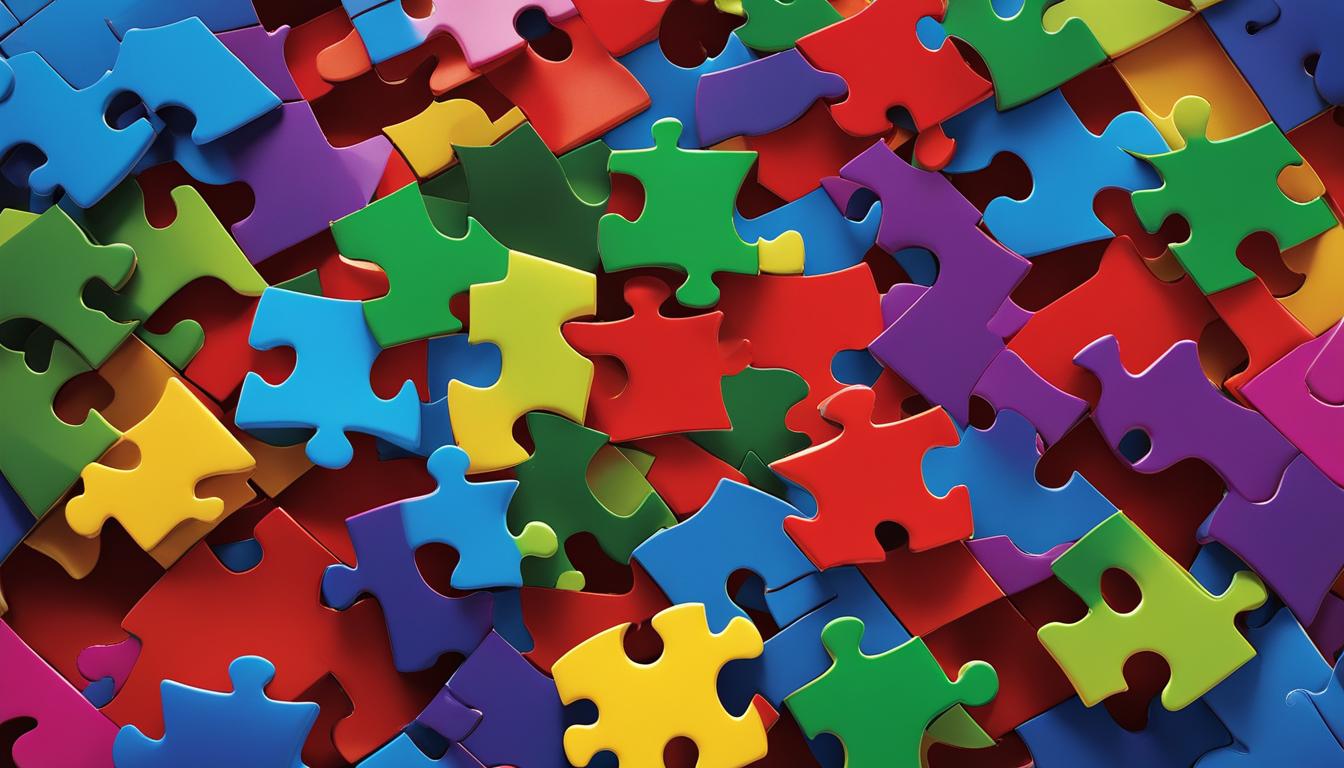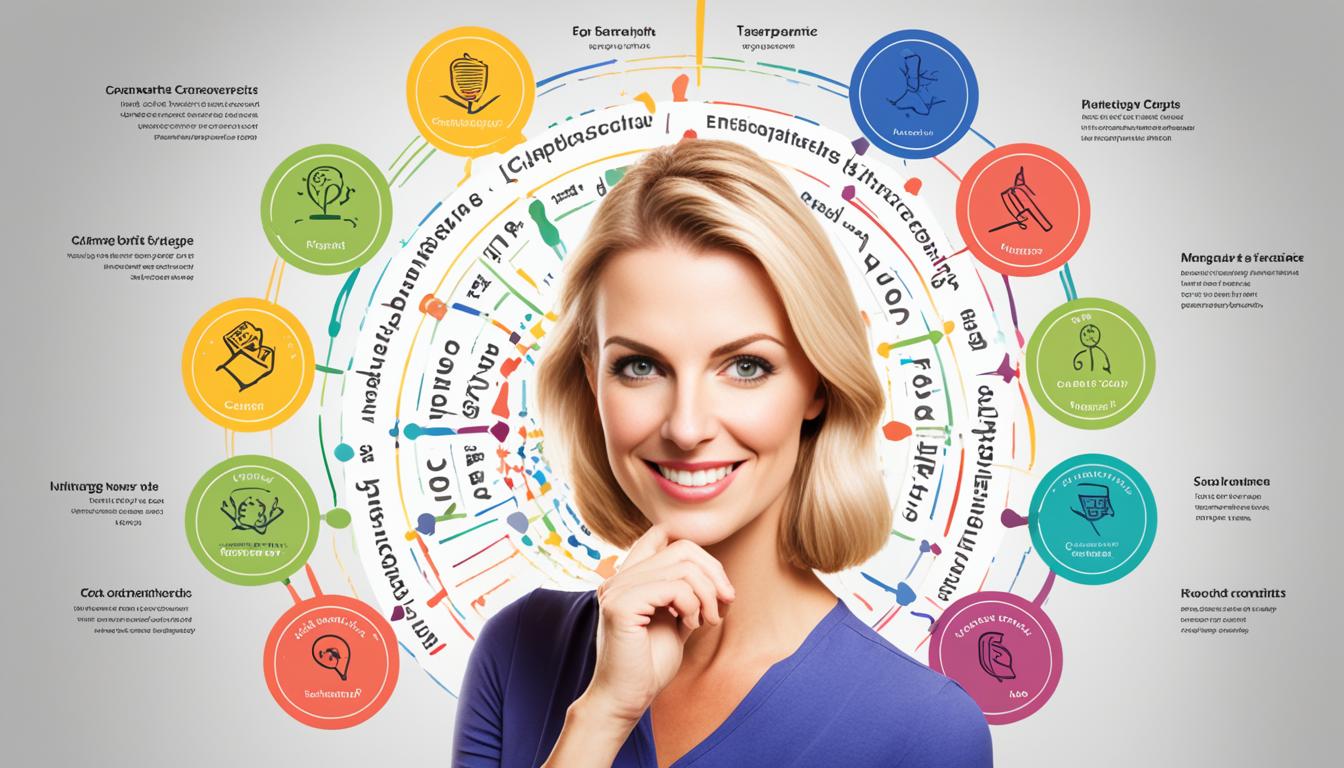In the fast-paced world we live in today, teenagers often feel overwhelmed and uncertain about where they fit in. Were you aware that 92% of teenagers experience a lack of direction and purpose? Adolescence is a critical period for self-exploration and recognizing one’s unique attributes, as it lays the groundwork for future achievements. This is why we are excited to present the Personality Academy’s free online personality quiz designed specifically for teenagers!
Key Takeaways:
- Taking a personality test can help teens gain self-knowledge and navigate life with more confidence.
- Self-reflection is crucial for personal growth and building strong relationships.
- Personality tests allow teens to explore different personality types and understand how they interact with the world.
- Understanding one’s personality can guide teens in making informed career and college choices.
- Personality tests enhance interpersonal relationships by improving communication skills and empathy.
The Importance of Self-Reflection for Teens
Self-reflection is a crucial process for teenagers as it allows them to better understand their emotions, thoughts, and behaviors. By taking a personality test, teens can gain insight into their strengths and weaknesses, develop emotional intelligence, and enhance their self-awareness. Self-reflection is the first step towards personal growth and building strong relationships with others.
When teens engage in self-reflection, they create space to examine their own thoughts, feelings, and reactions. This introspective practice fosters a deeper understanding of their own unique qualities and characteristics. Through self-reflection, teens can identify their personal values, ambitions, and desires, which ultimately contribute to their sense of self.
Emotional intelligence, another crucial aspect of self-reflection, enables teens to navigate their emotions and understand the emotions of others. By increasing their emotional intelligence, teens can effectively manage stress, communicate more empathetically, and forge meaningful connections with their peers.
Self-reflection is the mirror that allows us to see who we truly are and is the foundation for personal growth and self-awareness. Taking the time to pause, reflect, and analyze our own thoughts and emotions is a vital skill for teens to develop. It empowers them to make conscious choices, cultivate resilience, and embrace personal growth.
The Benefits of Self-Reflection for Teens
Self-reflection offers numerous benefits for teenagers as they navigate the challenges of adolescence and prepare for their future. Here are a few key advantages:
- Enhanced self-awareness: Self-reflection helps teens understand their own strengths, weaknesses, and personal preferences, empowering them to make informed decisions.
- Improved decision-making: By reflecting on their thoughts, feelings, and values, teens can make better choices aligned with their goals and values.
- Strengthened self-esteem: Understanding and accepting oneself leads to increased self-confidence and a positive self-image.
- Effective communication: Self-reflection sharpens communication skills, enabling teens to express themselves clearly and listen actively to others.
Engaging in Self-Reflection
Teens can engage in self-reflection through various practices and activities. Here are a few suggestions:
- Keeping a journal: Writing down thoughts, feelings, and experiences can provide insight and serve as a starting point for self-reflection.
- Engaging in mindfulness activities: Practices such as meditation, deep breathing exercises, and mindfulness-based activities promote self-awareness and introspection.
- Seeking feedback: Asking trusted individuals, such as family members or mentors, for feedback can provide valuable perspectives and insights.
- Setting aside regular reflection time: Allocating specific time each day or week to reflect on experiences, choices, and emotions can foster personal growth.
Remember, self-reflection is a personal journey that takes time and practice. Encouraging teens to engage in self-reflection and providing them with the necessary tools and guidance can help them navigate the complexities of adolescence and set the stage for a fulfilling and successful future.
Exploring Different Personality Types
Personality tests are valuable tools for teens to delve into the world of different personality types and gain a deeper understanding of their own unique traits. These tests assess various dimensions of personality, including extraversion versus introversion, sensing versus intuition, thinking versus feeling, and judging versus perceiving.
By identifying their dominant traits, teens can explore how they interact with the world, make decisions, and navigate their daily lives. Let’s take a closer look at each of these dimensions:
Extraversion vs. Introversion
The extraversion and introversion dimension gauges whether teens gain energy from social interactions and external stimulation (extraversion) or from solitude and internal reflection (introversion). It helps them understand their social preferences and how they recharge their mental batteries.
Sensing vs. Intuition
The sensing and intuition dimension assesses how teens prefer to perceive information. Sensing individuals focus on the present and rely on their five senses, while intuitive individuals look towards future possibilities and rely on their gut instincts. This dimension helps teens understand their learning style and how they process information.
Thinking vs. Feeling
The thinking and feeling dimension explores how teens make decisions and evaluate situations. Thinking individuals prioritize logic and rationality, while feeling individuals prioritize values and emotions. This dimension provides insights into teens’ decision-making processes and how they navigate conflicts or challenging situations.
Judging vs. Perceiving
The judging and perceiving dimension describes how teens approach the outside world and organize their lives. Judging individuals prefer structure, planning, and organization, while perceiving individuals are more spontaneous and adaptable. This dimension sheds light on how teens manage their time, set goals, and cope with unexpected changes.
Taking a personality test helps teens gain a comprehensive understanding of these dimensions and obtain deeper insights into their personality type. It equips them with self-knowledge that facilitates personal growth, effective decision-making, and fruitful relationships with others.

The Impact of Personality on Career Choices
One of the benefits of taking a personality test as a teen is the insight it provides into potential career choices. By understanding their personality type and the strengths and weaknesses associated with it, teens can make more informed decisions about their future career paths. Personality tests can help identify interests and aptitudes that align with specific careers, providing valuable vocational guidance.
When teens have a clear understanding of their personality traits and preferences, they can narrow down their career choices to those that match their unique attributes. For example, someone with strong analytical skills and attention to detail may find a career in data analysis or finance to be a good fit. On the other hand, an individual with excellent communication and interpersonal skills may thrive in roles that involve working with people, such as counseling or sales.
Identifying strengths and weaknesses through personality tests can also guide teens towards career paths that align with their natural talents and abilities. For instance, someone who excels in creative thinking and problem-solving may find fulfillment in a career as an artist or graphic designer. Meanwhile, a person who enjoys structure and organization may excel in a managerial or administrative role.
Personality tests provide valuable insights into career choices by helping teens identify their interests and aptitudes, as well as the strengths and weaknesses associated with their personality type.
Moreover, understanding their personality type can assist teens in making more informed decisions regarding their career progression. For example, a person who prefers stability and routine may prioritize job security and steady growth, while someone who craves variety and excitement may prioritize new challenges and opportunities for growth.
Here is an example of how a personality test can help match interests and strengths to potential careers:
| Personality Type | Interests | Strengths | Potential Careers |
|---|---|---|---|
| Introverted, Detail-Oriented | Analyzing data, problem-solving | Attention to detail, logical thinking | Financial analyst, data scientist |
| Extroverted, People-Oriented | Helping others, communication | Empathy, interpersonal skills | Counselor, sales representative |
| Intuitive, Creative | Art, design, creative problem-solving | Innovation, imaginative thinking | Graphic designer, artist |
| Organized, Structured | Planning, managing projects | Efficiency, organization | Manager, administrator |
By considering their interests, strengths, and the types of careers that align with their personality type, teens can make more confident and fulfilling career choices. Vocational guidance gained from personality tests can contribute greatly to their long-term success and job satisfaction.

Making Informed College and Major Decisions
As teens prepare for college, the decisions they make about their college and major choices can have a significant impact on their future. This is where personality tests can be a valuable tool in helping them make informed decisions that align with their individual strengths, interests, and values.
By understanding their personality type and the types of environments they thrive in, teens can choose colleges that provide the right atmosphere for their personal growth and learning. Whether they prefer a smaller, close-knit campus community or a larger university with diverse opportunities, knowing their personality type can guide them towards colleges that offer the best fit.
Similarly, knowing their personality strengths and interests can help teens select majors that resonate with their passions and abilities. Whether they are drawn to creative fields, analytical subjects, or helping professions, understanding their personality can guide them towards majors that align with their natural strengths and provide fulfilling career paths.
Ultimately, making informed college and major decisions based on self-awareness and understanding can lead to a more satisfying educational experience and set the foundation for future success.

| Benefits of Personality-Based College and Major Decisions | How it Helps |
|---|---|
| 1. Improved Academic Performance | Choosing a college and major aligned with their personality can enhance motivation, focus, and overall academic success. |
| 2. Increased Engagement | When teens pursue majors that spark their genuine interests and align with their passions, they are more likely to stay engaged and committed throughout their college journey. |
| 3. Better Well-Being | Being in an environment that resonates with their personality can lead to improved overall well-being, mental health, and satisfaction. |
| 4. Enhanced Career Prospects | By choosing a major that aligns with their personality and strengths, teens can set themselves up for a successful career with opportunities for growth and fulfillment. |
Enhancing Interpersonal Relationships
Effective interpersonal relationships are at the core of our social connections, and personality tests can play a significant role in enhancing these relationships. By understanding our own personality preferences and those of others, we can cultivate better communication skills, deepen our understanding of others, and develop empathy.

When we recognize our own personality traits, we gain valuable insights into how we communicate and interact with others. This self-awareness allows us to adapt our communication styles and strengthen our connections with peers, family members, and educators. By understanding that different individuals may have different preferences, we can tailor our approach to meet their needs, fostering more harmonious relationships.
Developing empathy is another vital component of enhancing interpersonal relationships. Personality tests provide a framework for understanding different personality types, enabling us to put ourselves in others’ shoes and gain a deeper appreciation for their perspectives. Empathy allows us to bridge gaps in understanding, resolve conflicts more effectively, and build stronger bonds with those around us.
“Empathy is the key to great relationships. Understanding where others are coming from allows us to build stronger connections and navigate challenges with grace and compassion.” – Anonymous
Examples of Applied Knowledge:
| Personality Type | Communication Approach | Example |
|---|---|---|
| Introverted Thinker | Prefer written or analytical communication | Providing a detailed email response to address a concern |
| Extraverted Feeler | Prefer face-to-face or verbal communication | Sitting down for a heartfelt conversation to offer support |
| Intuitive Judger | Focus on long-term goals and planning | Organizing a group project and setting clear expectations |
| Sensing Perceiver | Flexible and adaptable communication style | Being open to spontaneous ideas during a brainstorming session |
By actively applying our knowledge of different personality types, we can tailor our communication approaches to suit the preferences and needs of others. This leads to more effective and meaningful interactions, ultimately strengthening our relationships.
Understanding and enhancing our interpersonal relationships through personality tests empowers us to build a supportive network of connections and fosters a positive environment for personal growth.
The Continual Journey of Self-Discovery
Taking a personality test as a teen is just the beginning of a lifelong journey of self-discovery and personal development. The insights gained from the test can serve as a foundation for further exploration and growth. Teens can use the knowledge gained to continually reflect on their strengths and weaknesses, set goals for personal development, and make choices aligned with their true selves.
Embarking on the path of self-discovery allows teens to uncover their unique qualities and understand themselves on a deeper level. It opens doors to personal growth and paves the way for a fulfilling life. By embracing self-discovery as a lifelong process, teens can navigate the ever-changing landscape of personal development with curiosity and enthusiasm.
Self-discovery goes hand in hand with lifelong learning. As teens continue to uncover new aspects of themselves and their interests evolve, they have the opportunity to pursue knowledge and skills that align with their passions. Lifelong learning encourages personal growth, expands horizons, and fosters a sense of purpose throughout life.
“The journey of self-discovery is not a destination; it is a continuous exploration of ourselves and the world around us. It is a lifelong commitment to personal development, learning, and embracing our true selves.”
“The journey of self-discovery is not a destination; it is a continuous exploration of ourselves and the world around us. It is a lifelong commitment to personal development, learning, and embracing our true selves.”
Setting Goals for Personal Development
Setting goals for personal development is a crucial aspect of the self-discovery journey. By reflecting on their strengths and weaknesses, teens can identify areas for improvement and set actionable goals. Whether it’s developing better communication skills, enhancing emotional intelligence, or acquiring new knowledge, goal-setting empowers teens to actively shape their personal growth.
H3: The Benefits of Lifelong Learning
- Continual growth and development
- Expanded knowledge and expertise
- Adaptability and resilience
- Enhanced problem-solving skills
- Increased creativity and innovation
- Broader perspectives and cultural understanding
The Importance of Reflection
Reflection is a vital practice in the journey of self-discovery and personal development. By taking the time to reflect on their experiences, thoughts, and emotions, teens can gain valuable insights and learn from their successes and failures. Reflection fosters self-awareness, promotes growth, and allows teens to make more informed choices as they navigate their individual paths.

As the self-discovery journey unfolds, teens may encounter challenges and setbacks. It is essential to approach these obstacles with resilience and determination. Every experience, whether positive or negative, contributes to personal growth and brings individuals closer to their true selves.
By committing to self-discovery and lifelong learning, teens can unlock their full potential, cultivate their passions, and lead fulfilling lives. The journey is ongoing, and each step taken is an opportunity for growth, self-improvement, and embracing the beauty of personal development.
Recommended Personality Tests for Teens
Are you ready to dive deeper into exploring your personality? We have compiled a list of recommended tests that offer free online personality quizzes for teens. These tests are not only informative but also fun to take. Plus, they are all printable, so you can keep a record of your results and reflect on them whenever you want.
| Personality Test | Description |
|---|---|
| Personality Academy Quiz | A comprehensive quiz that covers various aspects of personality, allowing you to discover more about yourself. |
| Four Animals Personality Type Test | Based on the four animal archetypes, this test offers insights into your dominant personality traits. |
| Big Five Personality Test | Explore the five fundamental dimensions of personality with this widely recognized test. |
| Holland Code Test | Discover your interests and how they align with different career paths using the Holland Code framework. |
| True Colors Personality Test | Uncover your personality preferences through a colorful lens, enabling a better understanding of yourself and others. |
| Myers-Briggs Type Indicator (MBTI) | Explore the sixteen different personality types and gain valuable insights into your strengths and communication style. |
| Narcissistic Personality Inventory (NPI) | Assess your narcissistic traits and gain a better understanding of yourself and how you interact with others. |
| Tony Robbins’ DISC Assessment | Discover your behavioral style and improve your relationships by understanding your communication preferences. |
| Personality Perfect: Free Personality Test | A user-friendly test that analyzes your personality traits and provides in-depth insights into your strengths and weaknesses. |
These recommended tests offer a wide range of approaches to understanding and exploring your unique personality. Whether you’re interested in psychology, career guidance, or simply gaining self-awareness, these tests have got you covered. Take advantage of their accessibility and printable formats to embark on an exciting journey of self-discovery and personal growth.

Conclusion
Taking a personality test as a teen is an invaluable tool for self-discovery, personal growth, and future success. It allows us to gain insight into our personality preferences, strengths, and weaknesses, which in turn guide our decision-making processes for career and college choices. By understanding ourselves on a deeper level, we can cultivate self-awareness and develop the necessary skills to navigate relationships and achieve our goals.
The journey of self-discovery doesn’t stop with the results of the test. It serves as a starting point for personal growth and continuous learning. Armed with the knowledge of our unique qualities and characteristics, we can make choices that align with our true selves and lead to a fulfilling future.
Embrace the opportunity to embark on the journey of self-discovery with a personality test. Embrace the unique qualities that make you who you are, and watch as personal growth and future success become within your reach.
FAQ
How can a personality test help teens?
Personality tests provide valuable insights into teens’ personality preferences, strengths, and weaknesses. They help teens gain self-knowledge and navigate life with more confidence and energy.
What is the importance of self-reflection for teens?
Self-reflection is crucial for teenagers as it allows them to better understand their emotions, thoughts, and behaviors. By taking a personality test, teens can develop emotional intelligence, enhance their self-awareness, and embark on a journey of personal growth.
What can teens learn about themselves by exploring different personality types?
By exploring different personality types, teens can gain a better understanding of how they interact with the world and make decisions. Personality tests assess characteristics such as extraversion vs. introversion, sensing vs. intuition, thinking vs. feeling, and judging vs. perceiving, helping teens identify their dominant traits.
How can a personality test impact career choices for teens?
Personality tests provide insight into teens’ personality types and the strengths and weaknesses associated with them. This helps teens make more informed decisions about their future career paths by identifying interests and aptitudes that align with specific careers.
How can personality tests help teens make informed college and major decisions?
By understanding their personality type and the types of environments they thrive in, teens can choose colleges that align with their preferences and values. Similarly, knowing their personality strengths and interests can guide them towards selecting majors that resonate with their passions and abilities.
How can personality tests enhance interpersonal relationships for teens?
Personality tests enhance teens’ communication skills and understanding of others. By recognizing their own personality preferences and those of others, teens can develop empathy and foster more harmonious connections with their peers, family members, and educators.
What is the continual journey of self-discovery for teens?
Taking a personality test as a teen is just the beginning of a lifelong journey of self-discovery and personal development. The insights gained from the test serve as a foundation for further exploration, self-reflection, goal-setting, and making choices aligned with one’s true self.
What are some recommended personality tests for teens?
Some recommended personality tests for teens include the Personality Academy quiz, the Four Animals Personality Type Test, the Big Five Personality Test, the Holland Code Test, the True Colors Personality Test, the Myers-Briggs Type Indicator (MBTI), the Narcissistic Personality Inventory (NPI), the Tony Robbins’ DISC Assessment, and the Personality Perfect: Free Personality Test. These tests are all free and printable, providing teens with a fun and accessible way to delve deeper into understanding themselves.
Why are personality tests invaluable for teens?
Personality tests are invaluable tools for self-discovery, personal growth, and future success. They help teens gain insight into their personality preferences, strengths, and weaknesses, which in turn guides their decision-making processes for career and college choices. By understanding themselves on a deeper level, teens can cultivate self-awareness and develop the necessary skills to navigate relationships and achieve their goals.









